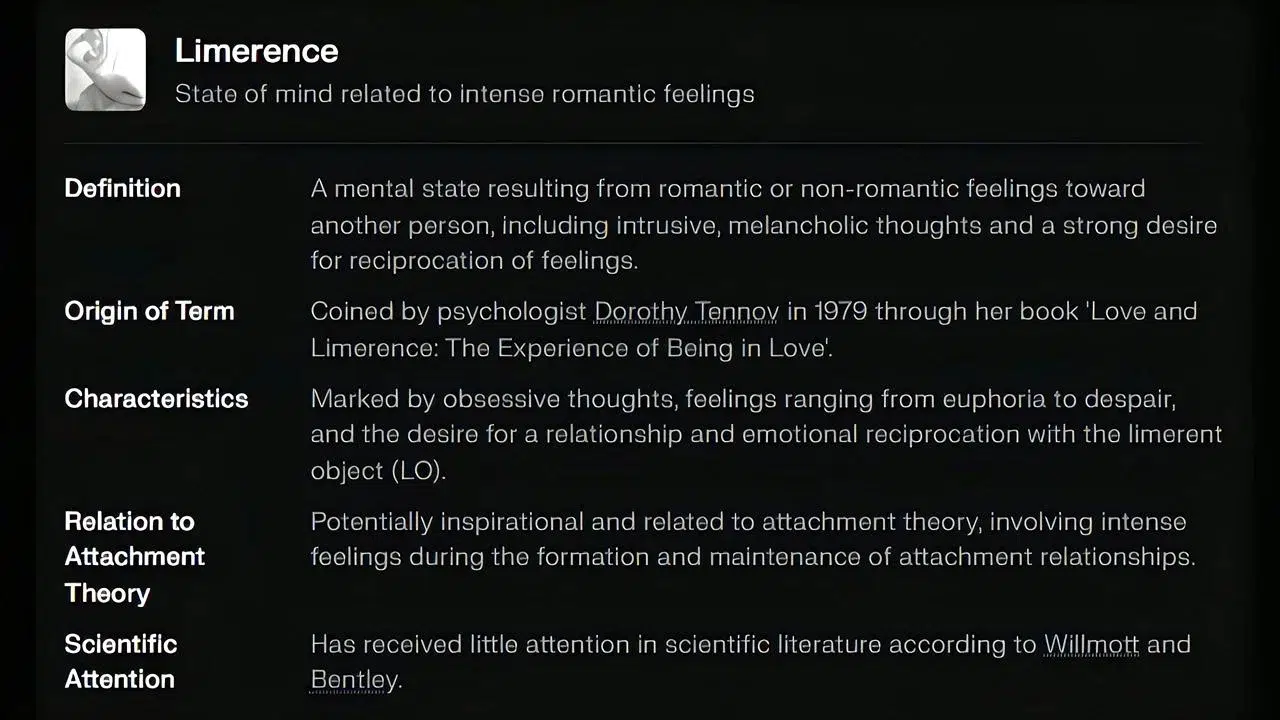Today's Thursday • 9 mins read
Some typical thoughts in the initial phase of limerence are:
- “She is perfect in every way!”
- “I must be with her at all costs.”
- “I can’t stop thinking about him!”
- “I need him in my life to be truly happy.”
- “I just know we’re meant to be together, it’s fate.”
But when your limerence ends, you see their flaws and feel rejected, and you still pine for them.
In contrast, when love ends, you live through grief, come to accept the closure, and move on.
What is Limerence?
Limerence is when you have obsessive thoughts, euphoric feelings, intense emotions, and a strong desire to be close to a particular person.
Your infatuation toward the person of your limerence may be romantic or non-romantic.
The term “limerence” was coined by psychologist Dorothy Tennov in the 1970s. She wanted the term to describe someone’s intense feelings of infatuation and desire for another person.
Limerence makes you ride a rollercoaster of emotions. Your moods can go from intense feelings of desire to feeling hopelessly in love.

Here’s how to tell if it’s limerence or love: Limerence is selfish and seeks validation and attention, while love is more selfless and wants to give and share.
Limerence is a state similar to obsession and usually goes through phases of attraction, attachment, and deterioration.
But how can you spot the signs that your limerence is ending?
10 Definitive Signs of Limerence Ending
Signs your limerence is ending are less constant and obsessive thoughts, and less intense desires, about the other person. You no longer feel euphoric or excited around them, lose your drive to be with them, and start seeing their flaws. There is less jealousy and possessiveness, fewer excuses for their behavior, more emotional stability, and a growing focus on your own life.
Here are the signs that your limerence is ending:
1. You are no longer obsessed with their every move.
A hallmark of limerence is being obsessed about the subject of your limerence.
For example, you have to compulsively see their pictures first thing in the morning and last thing at night.
You notice that your relentless fascination with their every move is fading. This reduction in obsession is a definite sign that your limerence is ending.
You no longer micro-analyze their actions. You do not spend hours scrolling through their social media.
You are less captivated by them. You grow more indifferent and stop worrying whether they’ll give you what you want or reject you.
You start spending more time with people you’re related to, like your partner or spouse. You may also feel regret over the affair.
This phase comes with you getting better at balancing emotions and having a healthy perspective on relationships.

2. You no longer think about the other person constantly.
When your limerence is ending, the thoughts that constantly dominated your mind begin to subside.
The person who used to be the fixed focus of your thoughts no longer occupies the same position.
As your waking moments are no longer occupied by them, you may start to notice a sense of emptiness. You often wonder what to do next now that they have “left” your mind.
You gradually get a sense of freedom. From your mind being tied to them, you feel free to focus on other urgent and important things in your life.
This decrease in mental preoccupation is a strong signal that your intense emotional phase of limerence is waning.
3. You start to see the flaws in your crush or partner.
As the limerence starts fading, people start to see their partner’s flaws more often and more clearly.
When you’re in the early stages of your limerence, you see your crush or partner as perfect. You idealize them, only see their good qualities, and even over-exaggerate their normal aspects.
The final stage of limerence starts when the attachment begins to fade and the limerent person no longer sees their object of love as perfect.
They may start noticing things that they didn’t before, such as annoying habits (like picking their noses) or personality traits that they find unattractive.
There may be a decrease in interest toward the limerent object and a return to one’s regular daily routine.
4. You no longer feel the past level of intensity in emotions.
As your limerence fades, you no longer feel the same level of euphoria or excitement when you are around them.
Moreover, you stop trying to go above and beyond to please your partner.
You may still feel affection for them, but it is no longer the all-consuming passion you felt before.
This can be a difficult transition. Your thoughts of addiction often surface, making you crave to do things to intensify your “love” for that person.
Gradually, you no longer have big changes in mood. You start becoming more present when you’re with your regular relationships.
You start to appreciate the little things that you took for granted when with your friends and family.
5. You no longer feel jealous or possessive of the other person.
When your limerence is winding down, feelings of jealousy or possessiveness that you previously harbored for the other person start to dissipate.
You become less agitated by their interactions with others and the thought of them not being exclusively yours no longer dominates your emotions.
This decrease in jealousy and possessiveness signifies a move away from the intense, often overwhelming attachment of limerence, hinting at a more balanced emotional state.
6. You are able to talk about the other person without feeling emotional.
As your limerence is fading out, discussing the other person no longer provokes the same intense emotional response as it once did.
Now you can mention their name, recall shared memories, and discuss their actions without the surge of euphoria, emotional pain, or longing that was previously typical.
There is a newfound emotional stability when you talk about them objectively.
It reflects a reduction in the obsessive nature of limerence, suggesting that you are regaining control over your emotions and moving beyond the tumultuous limerent phase.
7. You start questioning your own feelings.
As the intense emotions of limerence fade, people often start to question their feelings.
They may wonder if what they felt was real or just a temporary infatuation.
This can be a difficult and confusing time, as people try to sort out their emotions and figure out what they truly feel.
As time goes by, the intense feelings often fade away, and people are left wondering if what they felt was real or just a temporary infatuation.
8. You are no longer making excuses for their behavior.
When you’re intensely infatuated with someone, as in limerence, you tend to explain away their flaws and questionable behavior.
This is often because your emotional investment in them compels you to make excuses for their actions.
As your limerence subsides, you see their behavior more objectively and stop justifying or explaining away the other person’s less-than-ideal behaviors.
The rose-tinted glasses you once wore start to lose their tint. Now, if they are wrong, then they are wrong.
You’re no longer blinded by your emotions. You can judge them more rationally and understand the real motivations in their behavior toward you or anyone else.
Your newfound clarity signals the loosening of the strong emotional bonds with the person of limerence.
Emotional maturity starts to replace your judgmental irrationality toward the end of your limerence.
9. You are able to focus on other things in your life.
When your limerence is ending, you start to see things that need urgent attention, like those bags of undone laundry.
You rediscover the other aspects of your life that you had neglected during the height of your limerence.
“You are back” to engage more fully with your surroundings.
Your mental bandwidth expands to do more things, like work, hobbies, friendships, and personal development.
You are more in control of your focus and attention, gradually moving in to do those things that you neglected while you were in the throes of your limerence.
This attention shift is a key sign that your limerence is on the wane and will soon be relegated into a memory.
10. You start to think about your own future.
When people are in limerence, they often live in the moment, focusing only on the present and the intense feelings that they are experiencing.
However, as the limerence fades, people start to think about the future and what it holds for their relationship.
They may start to consider more practical matters, such as what type of partner would be a good fit for them the next time around.
you start to feel more comfortable with yourself and your own life.
You return to your normal routines and domestic priorities.
Can limerence come back after it has ended?
Is it possible to be in love without experiencing limerence?
How long does limerence last?
Final Words
Limerence is an emotional tornado that can make you feel on top of the world. Unfortunately, it is not a sustainable emotion. Limerence will inevitably fade. However, if you recognize the warning signs early enough, you can plan for the transition. You can safely leave the situation and learn to love normally again.
• • •
What can trigger your limerence?
√ If you liked it, please spread the word.
» You deserve happiness! Choosing therapy could be your best decision.
...
• Disclosure: Buying via our links earns us a small commission.
